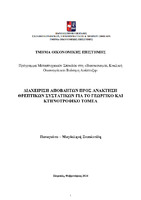Διαχείριση αποβλήτων προς ανάκτηση θρεπτικών συστατικών για το γεωργικό και κτηνοτροφικό τομέα
Waste management for nutrient recovery for the agricultural and livestock sector

View/
Keywords
Ανάκτηση θρεπτικών συστατικών ; Μακροθρεπτικά συστατικά ; Μικροθρεπτικά συστατικά ; Ορυκτά λιπάσματα ; Οργανικά λιπάσματα ; Γεωργικά απόβλητα ; Κτηνοτροφικά απόβλητα ; Κυκλική οικονομία ; Βιώσιμη ανάπτυξηAbstract
The depletion of resources and raw materials in food production worldwide has created an environmental, economic and social imbalance, leading to uninterrupted exploitation of natural resources, an increase in the cost of food products and an increase in the number of people dealing with conditions of extreme hunger. At the same time, the need to continuously produce new synthetic fertilizers, in order to maintain agricultural productivity, raises issues regarding nutrient safety. The economy model followed, the linear model, is based on the principles of consumerism and the continuous supply of products with a short useful life. The agricultural and livestock sectors are in the spotlight, as sustainable solutions are sought to achieve a productive agricultural system, based on the principles of a circular economy model. At this point, practices of recovery and recycling of valuable nutrients are the key step towards sustainable development, mitigating the risk of food security from the depletion of limited resources, whose existence is necessary in plant production. In this way, the emphasis is on innovative and effective methods of nutrient recovery from waste streams.
In this literature review, the importance of different nutrients for crop growth and the possibilities of recovering them from organic agricultural and livestock waste for the production of recovered organic fertilizer through biological and physicochemical methods were highlighted. The available methods analyzed, tend to show different results which depend each time on changing factors, such as the different composition of the waste. Therefore, analytical study and strategic planning are required for the broad and effective implementation of the concept of a circular food production system on a larger scale. However, such an approach holds significant benefits for the producers, the environment, the economy and society, in the context of sustainable development and safeguarding food security.


